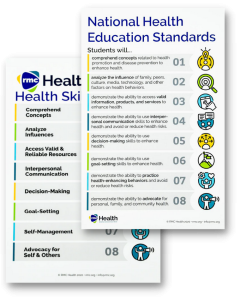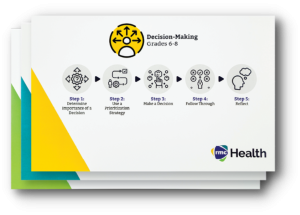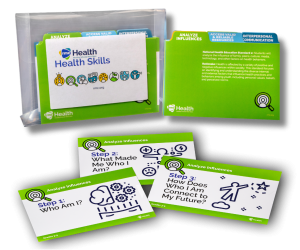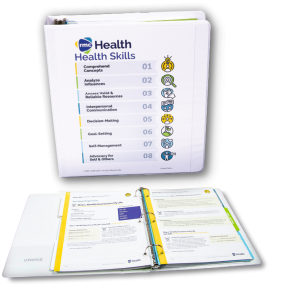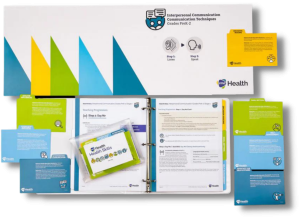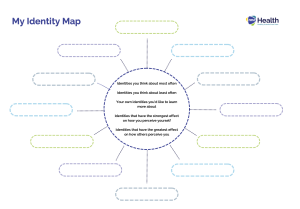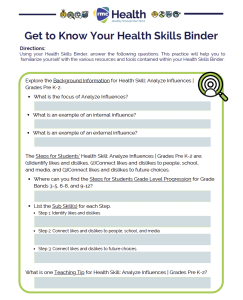Health Education Training Opportunities
RMC Health provides training and resources for K–12 teachers, schools, and districts to implement skills-based health education. The trainings focus on research-based strategies that encourage students to maintain healthy behaviors, change unhealthy behaviors, and delay the onset of risky behaviors. Based in both the Colorado Health Standards and the National Health Standards, RMC Health prepares educators to plan and assess skills-based health education and to provide students the opportunity to practice and master those skills. All trainings equip educators with the tools and strategies they need to create safe, inclusive, and effective health education classes by providing participants with hands-on activities, authentic practice of teaching strategies, and current research on health education.
-
Introduction to Skills-Based Health Education: Daily Lesson Planning, Mastery, and Assessment
Session Description:
Maintain healthy behaviors, change unhealthy behaviors, and delay the onset of risky behaviors for all students. Research shows that to reach these goals, health teachers need to specifically teach health skills. Teachers will first have an opportunity to explore the new Colorado Health Standards (effective 2020) and the National Health Standards to better understand the role that health skills play in comprehensive health education. Teachers will then learn how to supplement current unit and lesson plans with explicit health skill instruction. Teachers will leave the training with a foundational knowledge of skills-based Health Education, lesson plans that focus on student skill development, criteria of what student mastery should look like, and performance-based assessments that can be used in their classroom.
Participants will be able to:
- Explain the purpose of skills-based health education
- Utilize the Health Skills Progression Model to guide learning activities and teacher planning;
- Develop lesson plans to teach the introduction, reinforcement, and mastery of health skills.
-
Building Safety and Belonging in Health Education
Session description:
In the health education space, students are often asked to reflect on their own health practices and explore potentially sensitive topics. To develop student knowledge of health skills and concepts, teachers must first create a space where students feel safe and empowered to be themselves. In this training, participants will begin by understanding the role their own identities, along with student identities, play in creating safe and inclusive health education classrooms. The remainder of the training will be devoted to learning and applying teaching strategies grounded in culturally responsive and trauma-informed research. This hands-on training will give participants an opportunity to learn about these teaching practices and practice applying them through scenarios, interactive activities, and discussion.
Participants will be able to:
- Define safety and inclusion;
- Create vision and mission for safe and inclusive community in health education;
- Utilize teaching practices to foster safe and inclusive community in health education.
-
Practice, Practice, Practice: The Road to Students Mastering Health Skills
Session description:
Practice makes perfect. When it comes to skills-based health education, practice is the hinge that connects instruction and mastery. Providing real-life, engaging practice opportunities in the health education classroom is vital to ensuring that students develop their health literacy. In this training, participants will first have the opportunity to evaluate their current classroom structures and curriculum for opportunities that help students practice health skills as well as prepare them to apply the health skills to their daily lives. After evaluating their own classroom practices, participants will learn strategies for incorporating practice opportunities in their classroom and will create plans for their use in the Health Education classroom.
Participants will be able to:
- Evaluate personal classroom practices for student Health Skill development;
- Apply best practices that facilitate student mastery of Health Skills;
- Design engaging practice opportunities for Health Skills.
-
The Joy of Assessment: Empowering Students and Teachers through Mastery
Session description:
Go beyond paper and pencil tests. Health skills require assessments that are intentionally designed to measure a student’s understanding and abilities. This training will help shift the use of assessments solely as accountability tools to building the understanding that assessments are an opportunity for both the teacher and student to share in the joy of learning a new skill or concept. Participants will leave with a menu of assessment options that go beyond multiple choice and short-answer responses. Participants will also leave with creative ways to collect and track student data to show growth and inform instructional next steps.
Participants will be able to:
- Summarize the benefits to both teachers and students of measuring mastery;
- Create valid and reliable assessments aligned to state or National Health Education Standards;
- Utilize best practices for data collection to show student growth;
- Analyze student data to determine instructional next steps.
-
Deep Dive into the National Health Education Standards
Session description:
Creating connected relationships. Making responsible decisions. Combatting disinformation. Advocating for academic and mental health supports. The National Health Education Standards (NHES) outline 7 health skills that promote health and well-being including developing health literacy for students. In this highly interactive, 8-part virtual series, participants will explore each of the health skills and identify teaching strategies they can use to integrate the health skills into their instruction.
Participants will be able to:
- Explain how each of the health skill standards in the NHES connects to health literacy.
; - Utilize activities to include in instruction for the health skill standards in the NHES.;
- Summarize the progression model for teaching skills-based health education.
Although, not required it is recommended that the series is best suited for those who have a foundational knowledge of skills-based health education.
- Explain how each of the health skill standards in the NHES connects to health literacy.
Health Education Classroom Products

RMC Health, in collaboration with local and national health educators, have created instructional classroom products for the seven key health skills aligned with the National Health Education Standards and their performance indicators. These classroom products are designed to provide PreK-12 educators information on how to teach the health skills by breaking down each skill into manageable steps for students and providing example learning activities to introduce, reinforce, and assess each health skill.
Health skills classroom materials such as poster sets and student cue cards are available for purchase. To request a quote to purchase products in bulk or with a Purchase Order, submit an inquiry here.
-
Title & DescriptionLink
-
National Health Education Standards PostersThis set of classroom posters provides visual reference and engaging iconography aligned to each Health Skill and National Health Education Standard. One poster set includes two 11"x17"classroom posters. The first poster provides a list of the Health Skills and corresponding icons, while the second poster highlights the National Health Education Standards with their descriptions. Use for any grade span.
-
Health Skills Step Progression PostersAn excellent visual reference to hang in your classroom, one grade span poster set includes 11 double-sided 11"x17" posters for each Health Skill. Side one shows the Sub-Step Progression of the Health Skills, while side two shows the accompanying language of health literacy. Select Bundle and Save to purchase one set from each grade level, saving you 10% off the individual purchase price!
-
Student Cue CardsPerfect for your kinesthetic learners, the Student Cue Cards are a valuable hands-on tool for reinforcement of the Health Skills. Each grade span set contains multiple double-sided 4"x6" cue cards with engaging icons along with the Health Skill Steps and Sub-Steps, Sentence Stems for Health Literacy, and Valuable Vocabulary. Cards are organized in a small plastic storage case and indexed by skill. Tabs identify the skill, accompanying National Health Education Standard, and rationale.
-
Teaching Progression GuideOur Teacher Progression guide provides educators with a framework for incorporating the Health Skills into your classroom curriculum. This must-have binder is specific to each grade span and organized by health skill. Each section includes a Skill Overview, a breakdown of the Sub-Steps, Suggested Teaching Progressions, Suggested Learning Activities, Teaching Tips, and Sentence Stems for Health Literacy.
-
Bundle and Save - All Health Skills ProductsBundle up all of the Health Skills products for one grade span and save 15%, or maximize your savings by purchasing all four grade spans to save 25% off individual pricing! Each classroom bundle includes all the Health Skills teaching materials for one grade span. Within this bundle you'll receive one Teaching Progression Guide, one set of Student Cue Cards, one set of Health Skills Step Progression posters, as well as a set of the NHES and Health Skills Overview Posters. If you select All Grade Spans, you will receive everything in the classroom bundle for all four grade spans: PreK-2, 3-5, 6-8, and 9-12
Schedule a Free
Partnership Inquiry Call
The Health Skills
-
Title & DescriptionLink
-
Analyze InfluencesAnalyze Influences focuses on identifying and understanding the diverse internal and external factors that affect health practices and behaviors.
-
Access Valid & Reliable ResourcesAccess Valid & Reliable Resources prepares students to be able to critically evaluate the health information around them, whether that is from research articles, advertisements, people, and other print materials.
-
Interpersonal CommunicationInterpersonal Communication guides students to better understand, practice, and reflect on their interactions with others, developing effective speaking and listening strategies, boundary setting/refusal skills, conflict resolution skills, and collaboration skills.
-
Decision-MakingDecision-Making provides students with a process to approach decisions related to their health that require more thought and intention.
-
Goal-SettingGoal-Setting empowers students to strive for self-improvement by creating short and long term goals that have clear plans to help with follow through.
-
Self-ManagementSelf-Management helps students identify the areas in their life where they must take personal responsibility and develop the necessary health practices to maintain and improve their health.
-
Advocacy for Self & OthersAdvocacy for Self & Others helps students build the capacity to promote their healthy behaviors and to encourage their peers to develop and maintain their own healthy behaviors.
Other Health Education Resources
-
Title & DescriptionLink
-
Identity Mapping Activity"Enhance classroom inclusivity and understanding through our Identity Mapping activity, fostering self-awareness among health educators and promoting a more inclusive environment for students."
-
Getting to Know Your Teacher Progression GuideUse these worksheets to get to know your RMC Health Teacher Progression Binder. This practice will help you to familiarize yourself with the various resources and tools contained within your Health Skills Binder.
